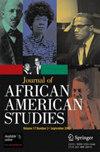Huey P. Newton
IF 0.5
Q3 ETHNIC STUDIES
引用次数: 0
Abstract
Huey Percy Newton (b. 1942–d. 1989) is a singular figure in African American history. Born in Monroe, Louisiana to Armelia Johnson and Walter Newton, he joined the Great Migration as a child when his family relocated to Oakland, California. He graduated from Oakland Technical High School in 1959, but forever claimed that school failed him, notably in the fact that he graduated without learning to read. Alongside self-directed learning, he then studied at Merritt College in Oakland, one of the city’s hotbeds of political discussion and activism. After joining, and becoming disillusioned by, a sequence of campus organizations, in October 1966 he formed the Black Panther Party (BPP) with his friend and fellow student Bobby Seale, who credits Newton as the principal architect of the BPP’s political philosophy and the driving force behind its early activism. The BPP initially focused on protesting police brutality in Oakland, most importantly through a sequence of patrols of police officers, which involved armed Panthers observing police activities in Oakland, informing local citizens of their legal rights during any arrest procedure and ensuring that the police conducted their duties lawfully and respectfully; and the May 1967 protest at the California State Capitol, one of the central events of the 1960s (although Newton was absent from the latter due to probation restrictions). On 28 October 1967 he was charged with the murder of Oakland police officer John Frey. The subsequent trial transformed the BPP and Newton into international phenomena. Despite a fervent “Free Huey” campaign and a bravura defense from his attorney, Newton was convicted of voluntary manslaughter. He served two years in prison, being released after his appeal revealed that the presiding judge of his original trial twice incorrectly instructed the jury and allowed disputed evidence to be presented to the jury. Two further retrials led to deadlocked juries. Returning in August 1970 to a transformed BPP, Newton struggled to cope with the fame and expectations placed upon him. Just as important was an extensive FBI campaign of disinformation, surveillance, infiltration, and occasional violence. Newton’s long-term use of cocaine did little to help. In 1974 he fled the United States for Cuba, fearing prosecution for the murder of a teenager, Kathleen Smith. He returned in 1977 to face the charges, which were eventually dropped. Following the collapse of the BPP amid accusations of financial impropriety, Newton essentially disappeared from public life. He was shot and killed in West Oakland by Tyrone Robinson, a local gang member, following an altercation over a drug deal.休伊·牛顿
休伊·珀西·牛顿(生于1942年至今)1989)是非裔美国人历史上的杰出人物。他出生在路易斯安那州的门罗,父母是阿梅莉亚·约翰逊和沃尔特·牛顿。小时候,他的家人搬到了加利福尼亚州的奥克兰,他加入了大迁徙。1959年,他从奥克兰技术高中毕业,但他一直声称学校让他失望,特别是他毕业时没有学会阅读。除了自主学习,他还在奥克兰的梅里特学院(Merritt College)学习,这是该市政治讨论和激进主义的温床之一。在加入了一系列校园组织后,他的幻想幻灭了,1966年10月,他和他的朋友兼同学鲍比·希尔(Bobby Seale)成立了黑豹党(BPP),后者认为牛顿是黑豹党政治哲学的主要设计师,也是其早期激进主义背后的驱动力。BPP最初专注于抗议奥克兰的警察暴行,最重要的是通过警察的一系列巡逻,其中包括武装黑豹观察奥克兰的警察活动,在任何逮捕程序中告知当地公民他们的合法权利,并确保警察合法和尊重地履行职责;以及1967年5月在加利福尼亚州议会大厦的抗议活动,这是20世纪60年代的中心事件之一(尽管牛顿由于缓刑限制而缺席了后者)。1967年10月28日,他被控谋杀奥克兰警官约翰·弗雷。随后的试验使BPP和牛顿成为国际现象。尽管牛顿发起了热烈的“释放休伊”运动,他的律师也进行了大胆的辩护,但他还是被判犯有故意杀人罪。他在监狱服刑两年,在上诉后被释放,因为他的原审主审法官两次错误地指示陪审团,并允许有争议的证据提交给陪审团。随后的两次重审导致陪审团陷入僵局。1970年8月,牛顿回到了改造后的BPP,他努力应对名声和人们对他的期望。同样重要的是联邦调查局广泛的造谣、监视、渗透和偶尔的暴力活动。牛顿长期服用可卡因并没有什么帮助。1974年,他逃离美国前往古巴,担心因谋杀少女凯瑟琳·史密斯(Kathleen Smith)而受到起诉。1977年,他回到美国面对指控,这些指控最终被撤销。在英国人民党因财务不当行为被指控而垮台后,牛顿基本上从公众生活中消失了。他在西奥克兰因毒品交易发生口角后被当地黑帮成员蒂龙·罗宾逊枪杀。
本文章由计算机程序翻译,如有差异,请以英文原文为准。
求助全文
约1分钟内获得全文
求助全文
来源期刊

Journal of African American Studies
ETHNIC STUDIES-
CiteScore
0.80
自引率
0.00%
发文量
30
期刊介绍:
The Journal of African American Studies publishes original research on topics of professional and disciplinary concern for the social progress of people of African descent. This includes subjects concerning social transformations that impact the life chances of continental Africans and the African diaspora. Papers may be empirical, methodological, or theoretical; including literary criticism. In addition to original research, the journal publishes book reviews, commentaries, research notes, and occasional special thematic issues. African American Studies is an interdisciplinary field; diverse disciplinary methods and perspectives that include anthropology, art, economics, law, literature, management science, political science, psychology, sociology, social policy research, and others are appreciated.
 求助内容:
求助内容: 应助结果提醒方式:
应助结果提醒方式:


